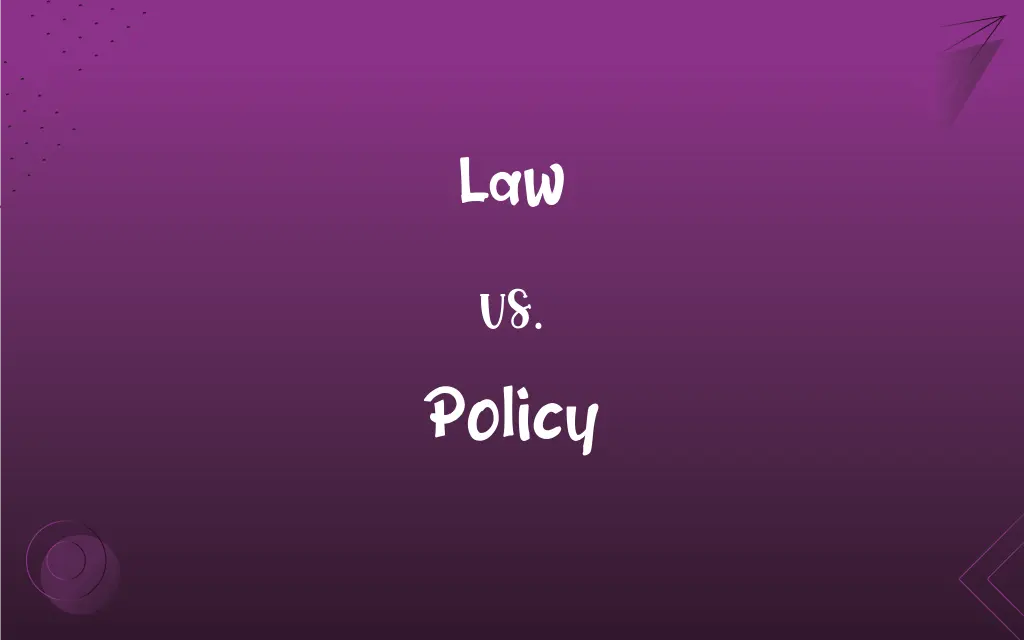Law vs. Policy: What's the Difference?
Edited by Aimie Carlson || By Harlon Moss || Updated on October 13, 2023
Law is a system of rules created and enforced through social or governmental institutions. Policy is a course or principle of action proposed or adopted by an organization or individual.

Key Differences
A law is a rule established by authority, society, or custom, which is recognized as enforceable by a governing authority. Conversely, a policy is not legally binding, but rather a guideline or a set of guidelines set forth by an organization to help it achieve its goals and objectives.
Policies are typically adopted by organizations to influence and determine decisions and procedures, often formulated to achieve a particular outcome. Law, on the other hand, is a system of rules that is universally applicable to all members of a society or community and has legal consequences if not adhered to.
Laws are designed to maintain order, protect individual freedoms, and serve justice, and their violation typically results in a legal penalty or sanction. In contrast, violating a policy may have consequences, such as disciplinary action within an organization, but no legal penalties.
Policies are specifically developed by organizations or individuals to guide their own decision-making, without the legal authority and enforcement mechanisms that laws possess. Whereas laws provide a framework within which a society operates, policy lays down a pathway for decision-making and strategy.
Laws are generally established by governmental bodies, be they local, state, or federal, and they are enforced through a legal mechanism. Policies, however, may be established by various entities, including companies, schools, and other organizations, and they lack the enforceable nature of laws.
ADVERTISEMENT
Comparison Chart
Nature
Legally binding rules enforced by governmental authorities.
Guidelines or principles adopted by an organization.
Creation
Created and enacted by legislative bodies.
Formulated by organizations or individuals.
Enforcement
Enforced through legal means, often involving penalties.
Not legally enforceable, consequences vary.
Purpose
To maintain order, protect freedoms, and serve justice.
To guide decisions and achieve specific outcomes.
Applicability
Applicable to all members of a society or jurisdiction.
Applicable to members or parts of an organization.
ADVERTISEMENT
Law and Policy Definitions
Law
Law is a system of rules regulated by a particular country or community to govern the actions of its members.
The new law regarding data protection enhanced user privacy.
Policy
Policy can refer to a deliberate system of principles to guide decisions and achieve outcomes.
The school's anti-bullying policy has significantly impacted student behavior.
Law
Laws are created and enforced by governmental bodies to regulate societies.
The local government enacted a law to ensure clean air.
Policy
A policy outlines a course or principle of action adopted by an organization.
The company’s policy requires employees to take annual cybersecurity training.
Law
Law represents a legal system that sanctions or penalizes violations of said rules.
The defendant was found guilty of breaking the law.
Policy
A policy can denote written or unwritten guidelines or rules for decision-making.
The return policy allows for exchanges within 30 days of purchase.
Law
Law is used to shape politics, economics, and society in various ways.
The law requiring vaccination has changed societal norms.
Policy
Policies may be adopted by organizations to manage and steer actions towards desired outcomes.
The university’s admissions policy fosters a diverse learning environment.
Law
Law establishes standards, procedures, and principles that must be followed.
The constitution is the supreme law of the country.
Policy
A policy refers to strategies or guidelines crafted to influence and determine actions and procedures.
The new sustainability policy focuses on reducing waste across all operations.
Law
A rule of conduct or procedure established by custom, agreement, or authority.
Policy
A plan or course of action, as of a government, political party, or business, intended to influence and determine decisions, actions, and other matters
American foreign policy.
The company's personnel policy.
Law
The body of rules and principles governing the affairs of a community and enforced by a political authority; a legal system
International law.
Policy
A course of action, guiding principle, or procedure considered expedient, prudent, or advantageous
Honesty is the best policy.
FAQs
Can a policy be enforced legally?
No, policies are not legally enforceable but may have organizational consequences.
What is a law?
A set of binding legal rules enforced by a governing authority.
Can anyone create a policy?
Yes, any individual, group, or entity can create a policy for their purposes.
Can laws regulate policies?
Yes, laws can set frameworks within which policies must operate.
Is every law applicable nationwide?
No, laws can be federal, state, or local and apply accordingly.
Do laws only govern criminal matters?
No, laws can govern various aspects including civil, administrative, and regulatory matters.
Are laws static?
No, laws can be amended, added, or repealed based on societal needs and changes.
What is a policy?
A course or principle of action proposed or adopted by an organization.
Who creates policies?
Policies can be created by organizations, government agencies, or individuals.
Can breaking a law result in punishment?
Yes, violating a law can result in legal penalties.
Can breaking a policy result in punishment?
Not legal punishment, but possible organizational consequences.
Are policies mandatory to follow?
Within an organization, its policies are generally mandatory for members.
Can policies have an impact on the general public?
Yes, especially policies implemented by government agencies or large organizations.
Can policies conflict with laws?
Policies should comply with laws; if not, they risk invalidation or legal consequences.
Do all policies have to be written?
No, policies can be unwritten but are often documented to ensure clarity and consistency.
Who creates laws?
Laws are created by elected officials in a governmental setting.
Can a policy become a law?
A policy itself cannot, but its principles might inspire or become legislated.
Can a law restrict fundamental rights?
Laws can restrict rights, often to balance individual rights and societal needs, within constitutional limits.
Are laws the same in all countries?
No, laws can significantly vary between countries and jurisdictions.
Can policies exist without laws?
Yes, policies can exist independently, but they must adhere to relevant laws.
About Author
Written by
Harlon MossHarlon is a seasoned quality moderator and accomplished content writer for Difference Wiki. An alumnus of the prestigious University of California, he earned his degree in Computer Science. Leveraging his academic background, Harlon brings a meticulous and informed perspective to his work, ensuring content accuracy and excellence.
Edited by
Aimie CarlsonAimie Carlson, holding a master's degree in English literature, is a fervent English language enthusiast. She lends her writing talents to Difference Wiki, a prominent website that specializes in comparisons, offering readers insightful analyses that both captivate and inform.































































